
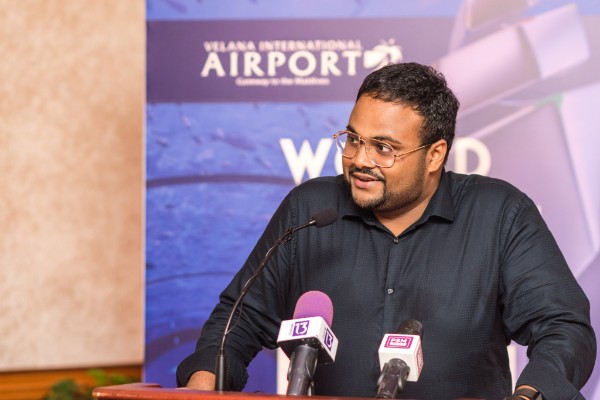
MATATO President Abdulla Ghiyas named 2018 PATA Face of the Future
BANGKOK, March 28, 2018 — Abdulla Ghiyas, President of the Maldives Association of Travel Agents and Tour Operators (MATATO) – one of the most active NGOs in the Maldives dedicated to fostering and promoting the sub industry of local travel agents, is today named as the 2018 PATA Face of the Future. This is the most prestigious honour open to young tourism professionals in the Asia Pacific region.
Dr Mario Hardy, CEO of the Pacific Asia Travel Association (PATA), said, “I would like to congratulate Abdulla on winning the 2018 PATA Face of the Future award. His clear commitment to the responsible development of travel and tourism in the Asia Pacific region is highlighted by his more than 10 years of service with MATATO and his many other activities and partnerships in the industry. In addition, his unique experience and insights will be a welcome addition to the Executive Board.”
As the 2018 PATA Face of the Future, Abdulla will have extensive exposure at the PATA Annual Summit 2018 from May 17-20 in Gangneung, Korea (ROK). He will be one of the speakers at the PATA Youth Symposium, be interviewed by BBC World News Presenter & Producer Sharanjit Leyl at the one-day conference and be one of the debaters at the UNWTO/PATA Leaders Debate. Abdulla will also be invited to join the 2018/2019 PATA Executive Board as a non-voting member and observer.
“I am truly overwhelmed and humbled to have been recognised with the prestigious PATA Face of the Future award. This award is for the hard-working team at MATATO and Inner Maldives Holidays, and every dreamer out there for believing that there is always room for thinking bigger, pushing limits and imagining the impossible,” said Abdulla. “Today we are living in an era of ever evolving challenges and changes. The role of youth and students across the globe is being redefined and I believe younger generations can play a vital role in travel and tourism. I look forward to working together with PATA and other travel industry stakeholders to further the role of youth and inspire them in joining this movement.”
Abdulla is a young energetic disrupter in the Maldivian tourism industry, who has changed the tourism landscape in the last few years by giving a voice to all Small Medium Enterprises in the industry.
MATATO is today considered the leading NGO in the Maldives with the association engaged in various activities such as advocacy and lobbying, training and workshops, fam trips, loan schemes via different financial institutions, recognition programs such as Awards, travel conferences and forums, publications and much more. The association last year organised destination stands and road shows, exhibiting brand Maldives in 14 countries around the world.
Abdulla is also a serial entrepreneur engaged in leading travel businesses and startups. He is the Deputy Managing Director of Inner Maldives Holidays, one of the largest inbound and outbound travel agency in Maldives. He is also a Director for Ace Travels Maldives and Spence Maldives, which are joint ventures with Sri Lankan blue chip conglomerate Aitken Spence PLC. Having 14 years of experience in the travel and tourism industry, Abdulla was the youngest Board Director of the Maldives Monetary Authority (MMA) from 2014 to 2017. He was also named by the Junior Chamber International (JCI) Maldives as one of the Ten Outstanding Young Persons in Maldives in 2010 for his role in business turnaround in Inner Maldives Holiday. Abdulla also contributes to the Consulate of the Republic of Seychelles to the Maldives as the Deputy.
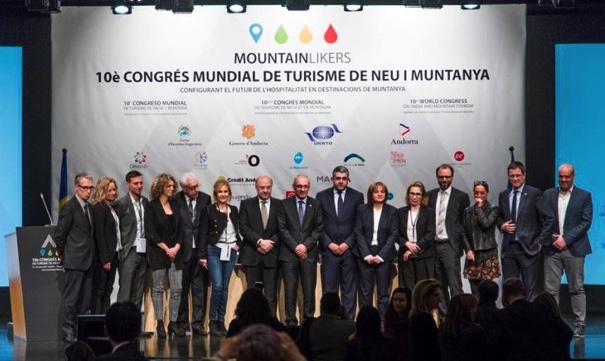
Snow and Mountain Tourism faces the challenge of adapting to change
Madrid, Spain, 27 March 2018 – The 10th World Congress on Snow and Mountain Tourism (Andorra, 21-23 March 2018) highlighted the need to adapt tourism accommodation to the expectations of today’s customers and to increase the quality of the traveller’s experience, while identifying knowledge management and hospitality culture as keys to success.
Organized jointly by the seven communes of the Principality, the Government of Andorra and the World Tourism Organization (UNWTO), this Congress constitutes a permanent forum for debate on the development and sustainability of tourism in mountain areas.
More than 400 participants attended the tenth edition of the Congress, including around thirty speakers from more than 16 countries and experts from Spain, the United States, Finland, France, Greece, Japan, the United Kingdom and Switzerland, among many others.
At the closing of the Congress, UNWTO Secretary-General Zurab Pololikashvili stressed the importance for mountain destinations to not only provide responses to the changing demands of travellers, but also to cover areas that range from “the need to build infrastructure and sustainable accommodations, quality professional training, as well as combating seasonality and optimizing resources”.
As a conclusion of the discussions over three days, the experts highlighted aspects that should mark the roadmap to follow for this segment of international tourism:
The tourism sector came out of the crisis reaching a record number of tourists and tourism accommodation supply and is taking the necessary steps to cater to a customer profile that is increasingly more demanding and more experienced.
Digitalization and globalization have created tourists with habits and expectations that are very different from those of traditional visitors, thus requiring products to be adapted to changing expectations on the demand side.
Certain aspects on the supply side must continue to be improved, keeping in mind that the quality of the visitor’s experience should be the central axis of this evolution.
Being able to offer hotels, ski slopes and tourism facilities that satisfy tourists is just one of the aspects that guarantee the success of a mountain destination. But there are other factors involved, such as knowledge management, the quality of services and the culture of hospitality.
University training and experiences are applicable to tourism activity, and in this regard, observation and research studies in mountain destinations have helped develop sustainable environments.
New digital platforms must offer security and trust for both owners and guests. In the area of accommodation regulations, Andorra presented its new legislation and highlighted its five objectives: respond to new customer behaviours, improve equity among groups of accommodations, reduce unlicensed operations and facilitate the regulation of illegal accommodation, and improve the quality and safety of visitors. In addition, Andorra has introduced online reputation for the first time as a new criterion for the classification of accommodation.

Zurab Pololikashvilion and Taleb Rifai not on talking terms?
Are UNWTO member states and affiliated members really aware of what is happening at the organization in Madrid?
Insiders within the UNWTO family think there may be a direct attempt by the current secretary- general Zurab Pololikashvilion to discredit the legacy of the very same person who made him get the position he currently has. This person is no other than former UNWTO secretary-general Taleb Rifai who put his influence and good reputation behind the avoidance of an open vote to confirm or not confirm Zurab Pololikashvilion in Chengdu. Mr.Pololikashvilio became UNWTO secretary-general by acclamation.
Today it’s obvious, there is a new ruler in Madrid surrounding himself with new close friends behind closed doors.
Today it becomes obvious people within UNWTO are worried and often work in fear and trying to hang onto their jobs.
Established programs, past achievements and even working policies are becoming a threat to the current Secretary-General.
Today it becomes obvious changes and secrecies and now a major audit is putting the well-praised legacy of former UNWTO Secretary-General Taleb Rifai in question.
When it comes to delivering an audit, quality is KPMG’s top priority. According to KPMG’s website, their audit professionals’ foremost responsibility is to serve investors, the capital markets, audit committees and management with reasonable assurance. According to information received from people close to UNWTO KPMG was hired by the UNWTO Secretary-General Zurab Pololikashvili. The reason is not clear, but justifying changes and cuts in programs and staff contracts or finding blame comes with audits.
It appears Mr. Pololikashvili is working on a new era at UNWTO and his upcoming report to the First Executive Council meeting in April in San Sebastian, Spain will shed some light on the direction the organization is taking. Since he took office, UNWTO no longer is the transparent, media-friendly and open organization it was in the past. Unfriendly cold war secrecy became a policy for the United Nations specialized agency in charge of promoting what is seen as the friendly industry, the tourism industry.
Audits are often used to justify certain steps, so gossip and fear within and around UNWTO is a sad reality today. It waits to be seen who the victims will be. Will Taleb Rifai be considered collateral damage?
The question remains for later. Will the UNWTO Executive Council be transparent and strong enough to analyze, question and if necessary correct the direction the organization seems to be taking.
eTN asked many questions without responses. eTN is aware of only one short press conference the new UNWTO boss attended. It was during FITUR. There was very little time for questions in Spanish only. Even at ITB Berlin, there was no UNWTO press-meeting. Ever since the new secretary-general took office not one media question by eTN was responded to, therefore this article is based on reliable information by sources and without input by UNWTO.
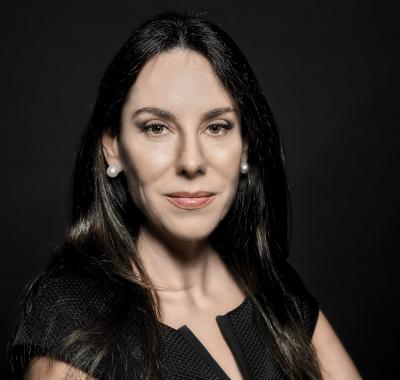
Leaving UNWTO: Yolanda Perdomo, Director of UNWTO Affiliate Members Program
Earlier this week Yolando Perdomo submitted her farewell letter to UNWTO Affiliated members.
The circumstances about her leaving are speculated about.
Yolanda has experience in both the public and private sectors and is an expert in tourism destination promotion and distribution. She has been Vice-Counselor for Tourism for the Government of the Canary Islands and Managing Director of PROMOTUR, the tourism promotion organization of the Canary Islands. There she directed communication and promotion campaigns for tourism, strategic plans, statistical and competitive analysis, loyalty campaigns and the creation of product clusters with the aim of diversifying and differentiating tourism products.
With InnovaTurismo, Yolanda has managed tourism projects in the private sector and has also been Director of the BungalowsClub booking portal, as well as Business Development Manager at Tourism Revolution Ecosystem (TRE). Currently, she is a professor at the Master of Tourism and Public Administration, a joint programme of the Spanish Tourism Office (Turespaña) and the National Institute for Public Administration, as well as a lecturer for the Executive Master in Innovation, Commercialization and Efficiency in Tourism (eMITur) at the ESCOEX International Business School.
Born in Lanzarote in the Canary Islands (Spain), Yolanda graduated in International Economics from the American University of Paris, studied Tourism at ULPGC and is an EU Politics and Collaboration expert for UNED and Jean Monnet Chair. She lived five years in France one year in the United States, three years in Italy and now works in Madrid. She speaks English, French and Italian. She was a member of the International Advisory Board of the Vienna Tourist Board during the development of its 2020 strategy and Doctor Honoris Causa for the University of Tourism and Management of Skopje, FY Republic of Macedonia.
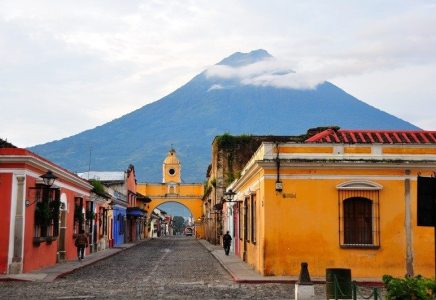
UNWTO: Good tourism practices to advance sustainable development in the Americas
Concrete examples of how to advance sustainable development through tourism take centre stage in the first joint publication between the World Tourism Organization (UNWTO) and the Organization of American States (OAS). ‘Tourism and the Sustainable Development Goals: Good Practices in the Americas’ provides 14 case studies from across the region on why tourism ranks high among the economic sectors better positioned to enable the Agenda 2030 for Sustainable Development and its 17 Sustainable Development Goals.
Ranging from tourism projects to strengthen the peace process in Colombia to initiatives in the heart of the Peruvian Amazon, addressing climate change in Mexico or providing insight into management and sustainability systems in Honduras or Panama. A total of 14 case studies portray the contribution of tourism to advance the Sustainable Development Goals in the Americas.
‘Tourism and the Sustainable Development Goals: Good Practices in the Americas’ recommends to pay critical attention to tourism management as well as to strengthening partnerships between national and international public and private stakeholders, as well as local communities. The report also addresses the emergence of a more responsible traveler and how destinations in the region should integrate resource efficiency and multi-stakeholder involvement in their policies, actions and initiatives.
“With more than 200 million international tourists who traveled to the Americas in 2017, tourism can and must play a significant role in delivering solutions for sustainable development in the region”, said UNWTO Secretary-General, Zurab Pololikashvili. “I am grateful for the partnership with the Organization of American States and am confident that together we will support tourism’s role in the sustainable development agenda of the region up to and beyond 2030”, he added.
According to the Executive Secretary for Integral Development of the OAS, Kim Osborne, this joint effort “provides greater awareness on how tourism can help address poverty alleviation, protect biodiversity and cultural heritage, and support community development in the Americas”.
Authorities at all levels in the Americas have identified tourism as a priority sector to promote economic development and diversification and countries across the region are adopting new legislation and policies in this direction. Against this backdrop, ‘Tourism and the Sustainable Development Goals: Good Practices in the Americas’ provides insight into how a common approach – including policy makers, private sector, tourists and the development community – can catalyze sustainable development through tourism.
The report was presented during the 2018 Inter-American Congress of Ministers and High-level Authorities of Tourism, under the theme ‘Connecting the Americas through sustainable tourism’.
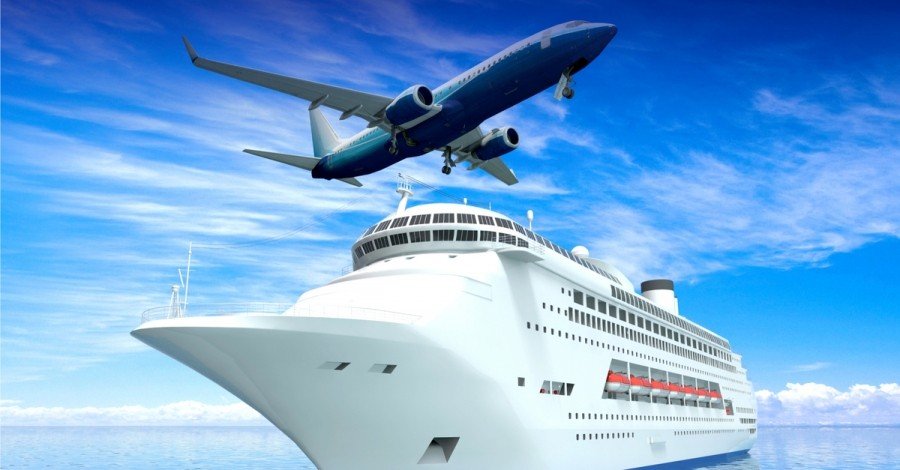
WTTC: One in five of all new jobs created in 2017 are attributable to Travel & Tourism
WTTC’s annual Economic Impact Research, released today, shows that Travel & Tourism was responsible for the creation of 7 million new jobs worldwide. The report also shows that 2017 was a bumper year for the global Travel & Tourism sector, which grew at 4.6%, 50% faster than the global economy as a whole (3% growth during 2017).
Gloria Guevara, WTTC President & CEO said, “Travel & Tourism creates jobs, drives economic growth and helps build better societies. Our research shows that our sector was responsible for the creation of one in five of all jobs globally. In the last few years, Governments around the world are realising the extraordinary benefits of tourism and I congratulate them for taking steps to maximise our sector’s potential.”
For the seventh consecutive year, the Travel & Tourism sector has outperformed the global economy and in 2017 was the fastest growing broad economic sector globally, showing stronger growth than all sectors including manufacturing (4.2%), retail and wholesale (3.4%), agriculture, forestry and fisheries (2.6%) and financial services (2.5%).
In 2017, Travel & Tourism’s direct, indirect and induced impact accounted for:
US$8.3 trillion contribution to global GDP (10.4%)
313 million jobs, 1 in 10 jobs around the world
US$1.5 trillion exports (6.5% of total exports, 28.8% of global services exports)
US$882 billion investment (4.5% of total investment)
Ms Guevara continued, “2017 was the best year on record for the Travel & Tourism sector. We have seen increased spending as a result of growing consumer confidence, both domestically and internationally, recovery in markets in North Africa and Europe previously impacted by terrorism and continued outbound growth from China and India. This is great news for the millions of people who depend on our sector for their livelihoods.”
Highlights from around the world include:
Europe’s performance was better than previously expected with 4.8% growth as long-haul demand recovered strongly, accompanied by strong intra-regional travel thanks to the strength of the European economy. According to the International Air Transport Association (IATA) in 2017, European airlines recorded passenger growth of 8.1% and over 1 billion passengers for the first time.
Travel & Tourism’s contribution to GDP in North Africa grew by 22.6% in 2017, showing a strong rebound from the impacts of terrorism in previous years. Stellar performance from Egypt (72.9%) and solid growth in Tunisia (7.6%) inspire confidence in the region as tourism activity continues to recover to pre-attack levels.
Asian countries continue to drive global tourism growth with North East Asia growing at 7.4% and South East Asia at 6.7%. China continues to lead the way at 9.8%. Over the next ten years over one third of absolute GDP growth and nearly half of employment growth will be generated by China and India.
Latin America showed a decline of 1.4% in tourism GDP, largely a result of a contraction in international spend to the largest Latin American economy, Brazil, of 18.1% compared to 2016, and compounded by the ongoing political and economic problems in Venezuela.
Forecasts for 2018 suggest that growth will continue, albeit at a slower rate than in 2017 as a result of higher oil prices.
The long-term outlook to 2028 remains unchanged, with average growth of 3.8% per year over the next decade. However, by 2028, Travel & Tourism is expected to support more than 400 million jobs globally, which equates to 1 in 9 of all jobs in the world; and the sector is expected to contribute around 25% of global net job creation over the next decade.
Ms Guevara added “As our sector continues to become more important both as a generator of GDP and jobs, our key challenge will be ensuring this growth is sustainable and inclusive. Going forward we need to ensure that growth is planned for, well managed and includes partnerships between not only the public and private sectors but also includes communities themselves. There is a huge potential for governments to capitalise on the opportunities Travel & Tourism brings to create new jobs, especially in those economies where many jobs in other sectors are under threat from automation. Travel & Tourism is the best partner for governments to create jobs.”
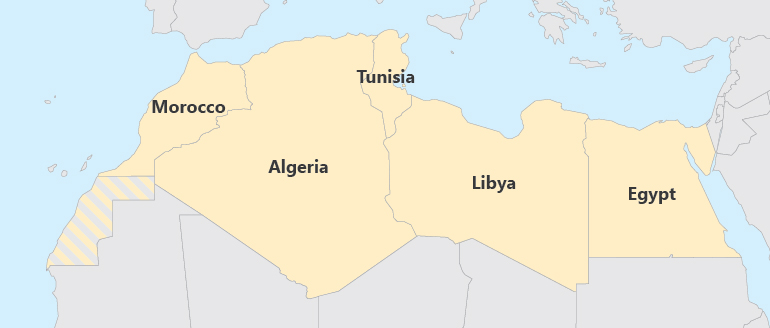
2017 saw significant recovery for tourism in North Africa
Travel & Tourism in countries previously hit by terrorism and political unrest started to show signs of strong recovery in 2017, according to the World Travel & Tourism Council’s (WTTC) latest Economic Impact Report, launched today.
Overall T&T growth in North Africa was 22.6% in 2017, more than three times faster than any other world region and five times faster than the world average of 4.6%. Driving this growth was an excellent recovery in Egypt, where tourism’s contribution to GDP grew by 72.9% compared to 2016; and a strong but more muted recovery in Tunisia of 7.6%. In Turkey, tourism’s contribution grew by 17%.
GDP growth from Travel & Tourism massively outpaced growth in the whole economy in countries previously hit by terrorism. In Egypt the economy grew by 4.1%, in Tunisia by 2% and Turkey by 7.0%). This highlights the sector’s importance in driving economic growth in these countries.
Overall in 2017, Travel & Tourism generated US$21.1 billion of GDP in Egypt (11.0% of total GDP), US$5.7 billion of GDP in Tunisia (14.2% of total) and US$ 98.4 billion in Turkey (11.6% of total); and Travel & Tourism accounted for 8.5%, 13.0% and 7.4% of employment in each country respectively.
With this strong recovery in 2017 and promising forecasts for 2018, particularly as major source markets such as the UK return to the region, with the resuming of charter flights, these countries are well on track to return to pre-crisis levels.
Gloria Guevara, President & CEO of WTTC said, “In a year which has generally seen strong growth in the Travel & Tourism sector, this positive performance in Egypt, Tunisia and Turkey is very encouraging. Our research shows that public and private sector co-operation is key to a destination’s ability to recover from shocks such as terrorist attacks or political unrest, and I encourage the governments of these countries to continue with their engagement with the private sector in pursuit of future sustainable growth.”
“The experience of Egypt, Tunisia and Turkey as well as other countries which have suffered terrorist attacks in recent years, such as France and Belgium which also performed well in 2017, highlights how important it is that as an industry we find the balance between safe, secure and seamless travel. Security is paramount, and it will be vital in coming years that we optimise the use of technology, such as biometrics, to ensure secure and efficient travel, which will ultimately create and protect jobs.”
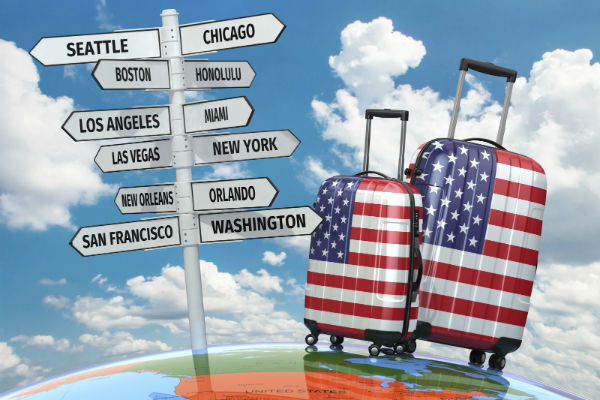
US tourism sector largest in the world, but losing share
The United States’ tourism sector continues to be the largest in the world, according to new research released today by the World Travel & Tourism Council (WTTC). Travel & Tourism generated US$1.5 trillion for the US economy in 2017, more than any other country in the world. US tourism ranks no 1 in the world for GDP contribution, and visitor exports (international tourism spend in the country).
In 2017, Travel & Tourism supported nearly 14 million jobs and over US$200 billion in exports.
Gloria Guevara, President & CEO of WTTC, said “The US has long been a world leader in tourism and remains in the no 1 spot for another year. Travel & Tourism is vital for the US economy, generating economic growth, employment and exports. Our research shows that Travel & Tourism directly supports nearly twice as many jobs as the banking sector, eight times more than the mining sector, and six times more than the automotive manufacturing sector. The tourism sector is the best partner the US can have in creating new jobs”
The data also shows that tourism in the US grew by 2.3% in 2017. This compares to 9.8% growth in China, 6.2% in the United Kingdom, 7% in Spain, and 5.5% in Canada. Global tourism growth outpaced the economy for the seventh year running, growing at 4.6% compared to economy growth of 3%, and significantly outpaced economy growth in many countries. Travel & Tourism grew four times faster than the wider economy in the UK, and twice as fast in Japan and Spain, for example.
However, in the US Travel & Tourism equalled total economy growth.
Guevara continued “The data suggests that the US is not getting its fair share, as other countries are increasing their tourism at a faster rate. This means there is a huge opportunity for the US to grow tourism to increase jobs and exports. The government is ideally placed to tap into this opportunity, by promoting the country so that visitors know that the US is open and welcoming, while being secure.
“The US has a strong foundation with the private sector working well with government, which we applaud and continue to encourage. Its Visa Waiver is being replicated in other countries, so should be protected at home. And the US Global Entry scheme is one of the best in the world – its expansion would encourage visitors, especially high spending business and regular travellers.

WTTC predicts a record year for South African tourism in 2018
Travel & Tourism is forecast to contribute more to the South African economy in 2018 than in any other year, according to major new research released today by the World Travel & Tourism Council (WTTC).
WTTC forecasts that the sector will contribute ZAR424.5 billion to the overall economy in 2018, a rise of almost 3% on 2017, and the highest since WTTC forecasts began.
Gloria Guevara, President & CEO, WTTC, said: “Travel & Tourism creates jobs, drives economic growth and helps build better societies, which is particularly the case in South Africa. WTTC predicts that our sector will contribute more to the South African economy than in any other year, which makes it the perfect partner for the new administration to put at the heart of the Government’s long-term economic plans.”
Other highlights of the report released today show:
Travel & Tourism supported 1.5 million jobs in 2017 (9.5% of total employment)
By 2028 almost 2.1 million jobs in South Africa are forecast to be dependent on Travel & Tourism
Travel & Tourism contributes 9% of the total GDP of South Africa, once all the direct, indirect and induced benefits are taken into account
Guevara continued: “Globally, 2017 was one of the strongest years of GDP growth in a decade. Our sector now supports one in ten jobs on the planet and contributes 10% of global GDP. Over the past ten years, one in five of all jobs created across the world has been in the sector and, with the right support from Governments, nearly 100 million new jobs could be created over the decade ahead.”

Saudi Arabia Travel & Tourism grew 4 times faster than wider economy in 2017
Travel & Tourism in Saudi Arabia is growing at a much faster rate than the wider economy, according to major new research released today by the World Travel & Tourism Council (WTTC).
The total contribution of Travel & Tourism to the Saudi economy in 2017 was SAR240.9 billion, once all the direct, indirect and induced benefits were taken into account. This represented an annual rise of 4.6% against GDP growth of 1% for the wider economy.
This shows the Saudi economy is particularly well placed to benefit from Travel & Tourism as part of the diversification of the economy under the Saudi Arabia Vision for 2030.
Other highlights of the report released today show:
Travel & Tourism supported 1.2 million jobs in 2017 (9.1% of total employment)
By 2028 over 1.5 million jobs in Saudi Arabia are forecast to be dependent on Travel & Tourism
Travel & Tourism contributes 9.4% of the total GDP of Saudi Arabia
Gloria Guevara, President & CEO, WTTC, said “Travel & Tourism creates jobs, drives economic growth and helps build better societies. This is particularly the case in Saudi Arabia where our sector is growing at over four times the rate of the wider economy. This means the country is particularly well placed to use Travel & Tourism as a driver of economic growth and job creation within the Government’s Saudi Arabia Vision for 2030 masterplan to diversify the economy.”
“Globally, 2017 was one of the strongest years of GDP growth in a decade. Our sector now supports one in ten jobs on the planet and contributes 10% of global GDP. Over the past ten years, one in five of all jobs created across the world has been in the sector and, with the right support from Governments, nearly 100 million new jobs could be created over the decade ahead.”
